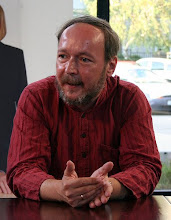
The title of this article I borrowed from Prof. Upendra Baxi, though I may use it in a different sense. I have been thinking a lot about prejudices. For the first time in my life I have been staying in a part of the world where white people are a minority. In addition, the role they played in the history of the country is highly controversial. After many years I had the exposition to a huge number of professionally trained (biased?) psychiatrists, whose training can easily make them sanists. Every now and then I face ableism. Many of my friends have been activists or beneficiaries of feminism, so I became quite aware of sexism...
One is tempted to raise the question if it is possible at all to be free from these and many other "-isms"? This question is more urging if we work in the field of human rights.
I don't believe that anyone can be absolutely free of prejudices. If someone tells me he/she has no prejudices, I frankly don't believe it. And I don't think I am cynical. It may happen that we are unaware of (some) of our prejudices. But remember: unconscious prejudices are the most dangerous, the most killing ones.
Fairness and common sense reasoning requires that we admit our prejudices. Our vulnerability. Only then have we chance to fight them.
I met many human rights activists and scholars who were eloquent anti-racists, or feminists, etc. and still when speaking about "mentally ill" people, that is about me, forgot about the universality and indivisibility of human rights and thought it is just legitimate to deprive me of my liberty, of my equality before the law, etc on the ground of my disability (maybe in conjunction with some other attribute).
Human rights, if we take it seriously, is about a world without prejudices. But human rights activists are human beings and share all human vulnerabilities, including prejudicial thinking. And the more intelligent a human is, the more easily can rationalise his/her prejudices. Human rights activists are not necessarily the least prejudiced people.
We need to know that a rigid distinction between me and non-me automatically leads to prejudices. But how can we, if at all, go beyond that distinction? Just knowing that every one of us is equal and this means both same and different, is insufficient. Social psychological defence mechanisms, such as cognitive dissonance prevent us from conducting ourselves in accord with this knowledge whenever highly marginalised groups are at stake. Honestly, what do you feel and think when pass a homeless person in the street?
I had the privilege to feel and live that the 6 billion of us is just one being. Yes, this happened in a psychotic episode. Or it resulted in a psychotic crisis? The experience was wonderful but too much.
Knowing that all we are one seems to be insufficient, feeling and living it seems too much. Is there a way out? Prof. Baxi's phrase on human rights and the right to be human can be useful. Let us think about it. And let us feel about it.
Source of the photo of Siquerios' paitning entitled The March of Humanity:
Jason & NathaliePhotographer: Jason & Nathalie From: The story of D.F.

No comments:
Post a Comment